Veteran Hong Kong actor Law Lok-lam had an un-usual run of bad luck when he set what could be a record by dying in five different soap operas in a 24-hour period more than a week ago.
His character met a bloody end during a fight in the martial arts drama “Grace Under Fire” and he vomited blood before expiring in “Face to Fate,” the Sunday Mor-ning Post reported on April 10.
In “Relic of an Emissary,” Law played the Ming emperor Zhu Yuanzhang who died after an illness.
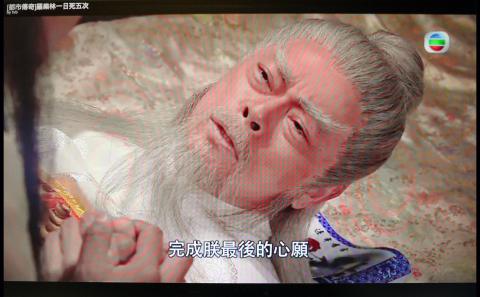
Photo: Lin Ya-ti, Taipei Times
照片:台北時報林亞蒂
In two other shows, “Police Station No. 7” and comedy “Virtues of Harmony” the actor did not die on screen but his death was discussed, the paper said.
Hong Kong actors whose characters die are given a red envelope with a token amount of money for good fortune, and Law, 63, received several from the superstitious production crews before shooting his death scenes.
“When I get a job, I don’t care if my character in the drama will die. If he is supposed to die, he should go on and die,” Law said in a video posted on YouTube by his employer, Hong Kong broadcaster TVB.
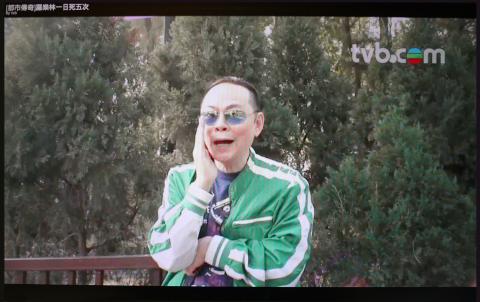
Photo: Lin Ya-ti, Taipei Times
照片:台北時報林亞蒂
However, Internet postings about his multiple “deaths” reportedly upset his daughter.
“Why would dying in a drama matter? It’s not for real. So my daughter, you shouldn’t be unhappy. The most important thing is I’ve done my job well,” Law said.
Some fans criticized TVB on the Internet for making him “die” so often in such a short space of time.
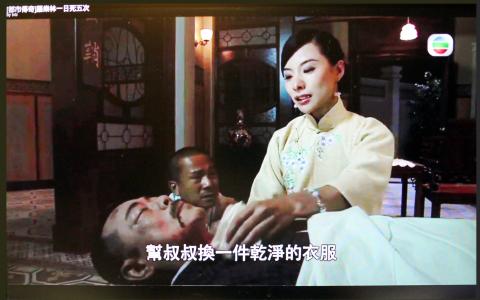
Photo: Lin Ya-ti, Taipei Times
照片:台北時報林亞蒂
A TVB spokesman quoted by the Post said: “It was purely a coincidence that Law died five times.”
(AFP)
香港資深演員羅樂林經歷了一連串非比尋常的壞運,因他在一週多前,創紀錄在二十四小時於不同連續劇中,連死五次。
《週日南華早報》四月十日報導,他在武打劇「女拳」中的角色,因一場打鬥喋血而終,並且在「布衣神相」斷氣之前還吐血。
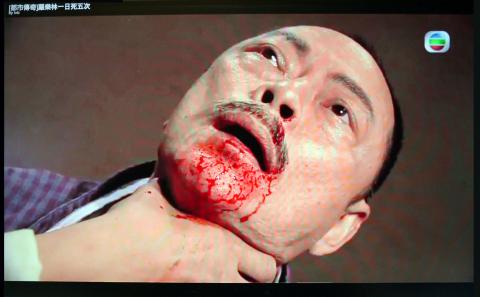
Photo: Lin Ya-ti, Taipei Times
照片:台北時報林亞蒂
羅在「洪武三十二」飾演死於疾病的明太祖朱元璋。
這篇報導指出,羅雖然未在另外兩齣戲「七號差館」與喜劇「皆大歡喜」的螢光幕前死亡,不過他的死,也被討論。
香港演員在戲裡要飾演死亡的角色,都會收到象徵性的小額紅包開運;現年六十三歲的羅,在開拍他的死亡場景前,收到迷信的製作單位組員送的一些紅包。
羅樂林在他的東家香港電視廣播互聯網有限公司(TVB)雇主上傳到YouTube的影片說,「當我得到一份工作,我不在乎戲裡的角色將會死亡。若他應當死亡,他就應該上場去死。」
然而,有關他多起「死亡」的網路爬文,據說令他的女兒不開心。
羅樂林說,「為何在意死在一齣劇裡呢?它不是真的。所以我的女兒,妳不該不開心。最重要的事是,我有把我的工作做好。」
有些粉絲在網路上批評TVB讓他在這麼短的時間內「死」得這麼頻繁。
《週日南華早報》引用一位TVB發言人的話說,「羅連死五次,純屬巧合。」
(法新社/翻譯:林亞蒂)

Rice is essential to Japanese culture, tradition and politics. People take pride in the oval-shaped sticky Japonica grain, which is still a staple even though total consumption has fallen over the decades. But since last summer, prices have soared as supplies have fallen short of demand. The government has long paid farmers to cut back on rice acreage, and change to other crops to keep rice prices relatively high. To cope with shortfalls this year, the government has released rice reserves. But the grain has been slow to reach supermarket shelves. Anger over that was part of the reason the Agriculture Minister

In Taiwan, 7-Eleven convenience stores can be found on almost every street corner. With over 84,600 stores across 20 countries, 7-Eleven has more locations than any other retail business on Earth. For millions of people, the chain is an important part of daily life, providing coffee, quick meals, and essential items for those __1__. The history of 7-Eleven began nearly 100 years ago in Dallas, Texas. In 1927, the Southland Ice Company began selling blocks of ice that were used to keep fridges cool. Shortly after opening, the company __2__ its offerings to include groceries like milk, eggs, and
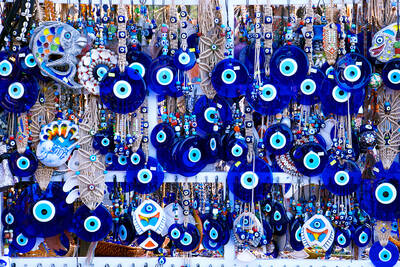
Step into any corner of Turkiye, and you’ll likely encounter the iconic “Evil Eye,” known as “nazar boncu?u” in Turkish. This striking blue glass ornament is shaped like an eye with concentric circles of dark blue, white, and light blue. While its name in English suggests something threatening, it’s actually a charm designed to ward off misfortune. The origins of the nazar boncu?u can be traced back to ancient Mediterranean and Middle Eastern traditions. The word nazar comes from Arabic, meaning “gaze,” while boncu?u translates to “bead” in Turkish. Central to the nazar boncu?u’s mythology is the idea that

Continued from yesterday(延續自昨日) https://www.taipeitimes.com/News/lang In 1946, the company adopted the name 7-Eleven to reflect its newly extended __3__, from 7am to 11pm, a novel concept at the time. As a rapidly growing company, it began offering franchise opportunities in the 1960s. In 1974, the first 7-Eleven in Japan was opened by the supermarket company Ito-Yokado. The Japanese franchises were __4__ successful that by 1991, Ito-Yokado was able to acquire a 70 percent stake in Southland Corporation. Its investments eventually resulted in full ownership of 7-Eleven, which paved the way for the Japanese company to enter the international market. Since then, 7-Eleven